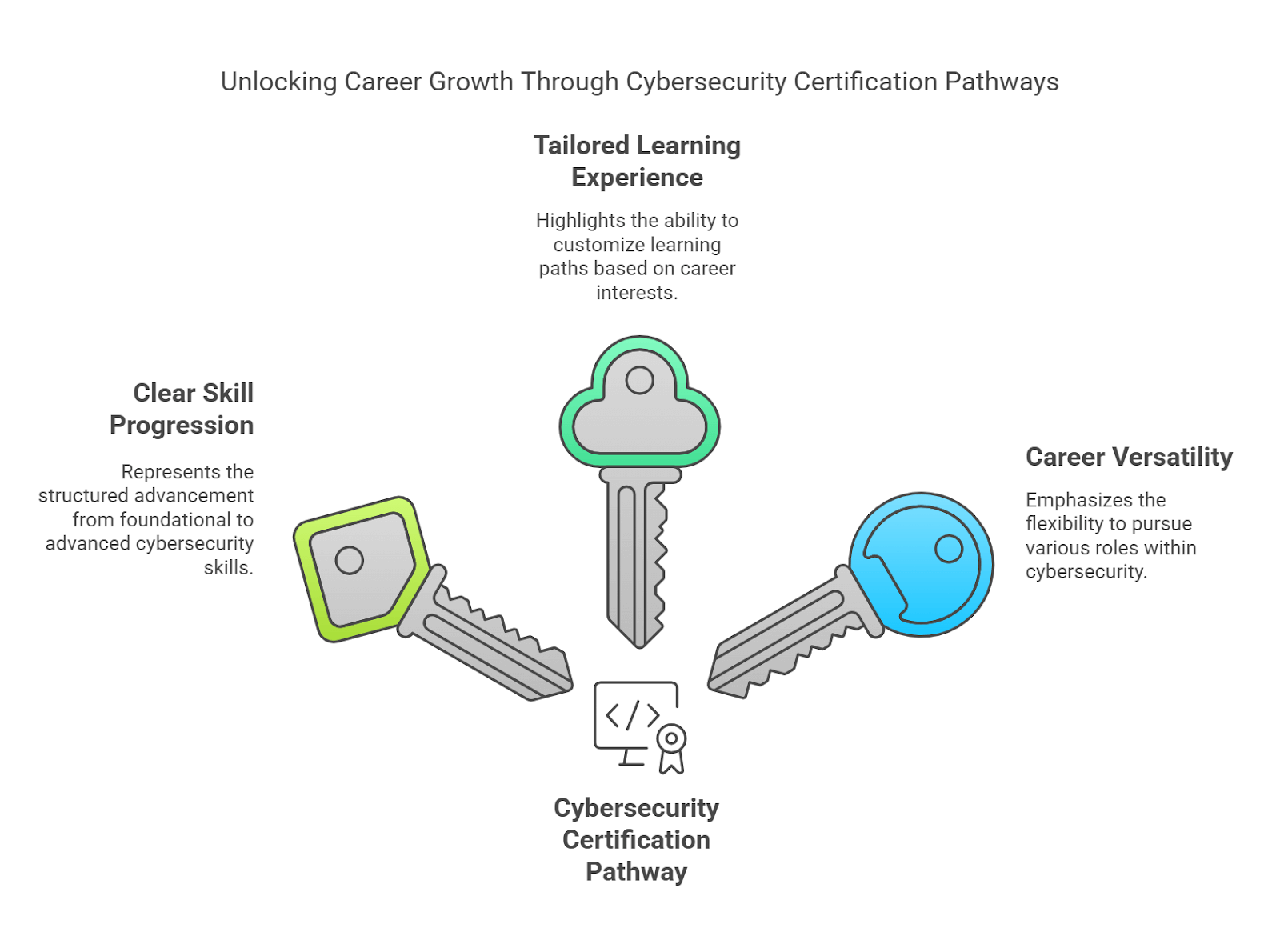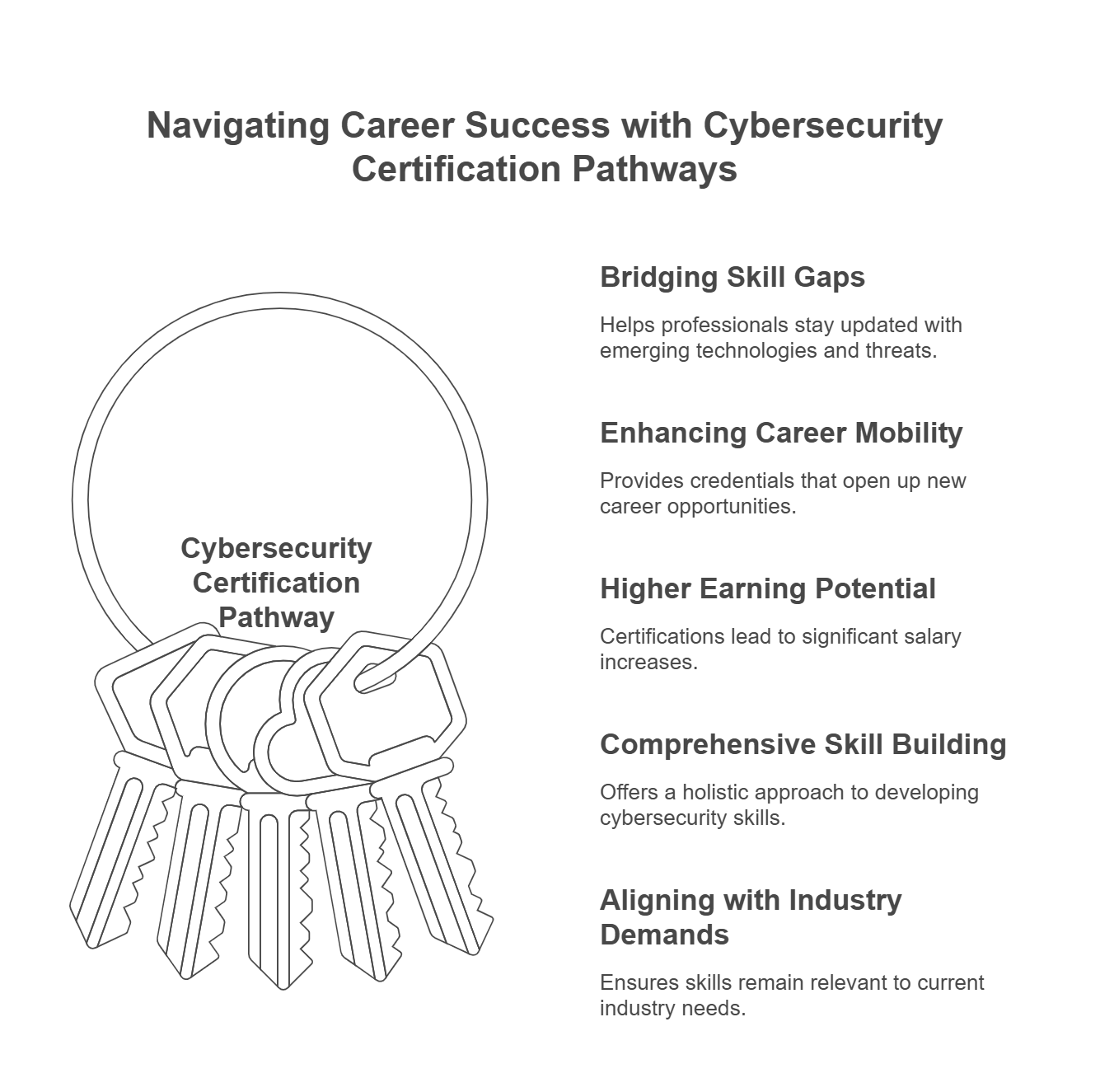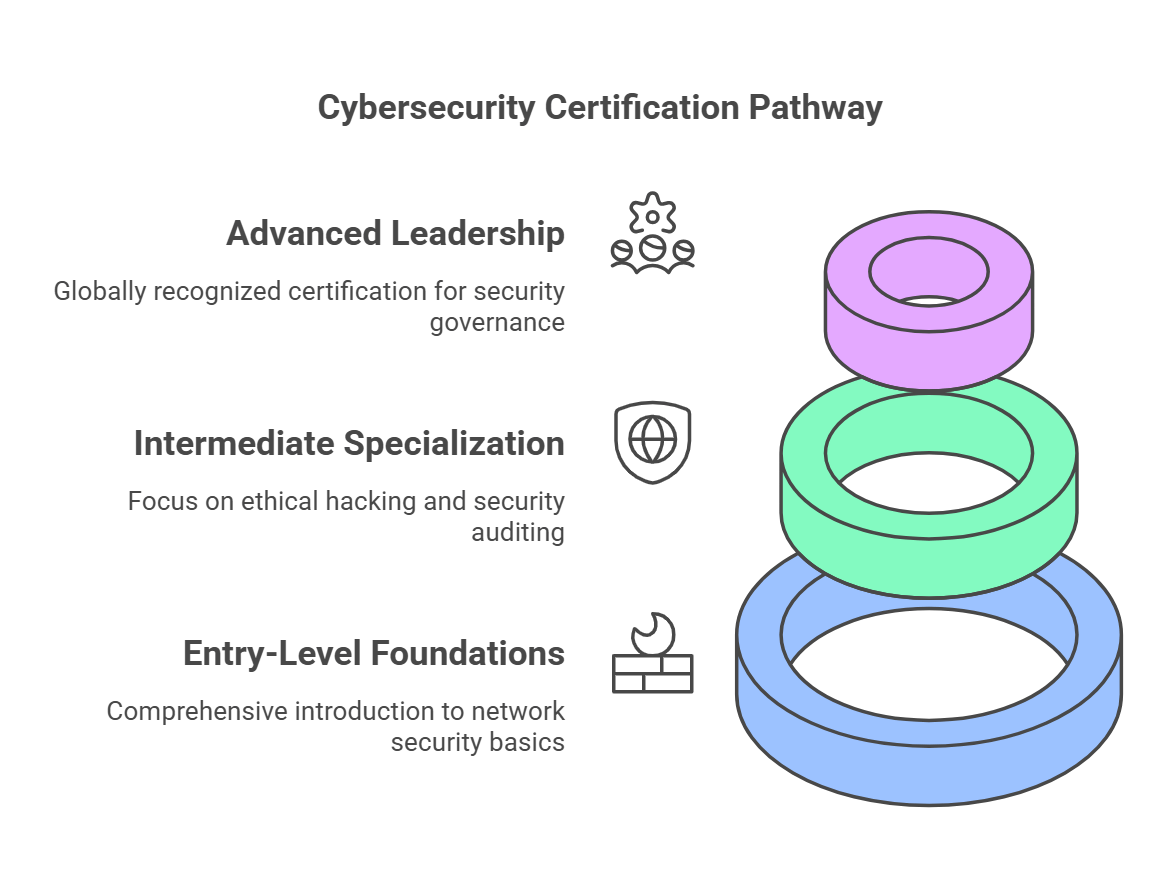Table of Contents
The cybersecurity field has become a crucial component of the digital landscape, with the increasing number of cyber threats highlighting the need for skilled professionals. This demand is creating ample career opportunities for individuals looking to make their mark in cybersecurity. A structured Cybersecurity Certification Pathway offers a clear roadmap for aspiring professionals to acquire the skills and credentials needed to succeed in this fast-growing field. The right certifications provide evidence of expertise, giving candidates an edge in a competitive job market.
As we step into 2025, the cybersecurity landscape continues to evolve, making continuous learning and skill acquisition essential. Cybersecurity certifications help professionals stay ahead of emerging threats, maintain career relevance, and enhance their employability. This guide will walk you through the importance of following a structured certification pathway, and how it can significantly impact your career and earning potential.
What Is a Cybersecurity Certification Pathway?
A Ultimate Guide to Cybersecurity Certification Pathway is a well-structured sequence of certifications that guide professionals at every stage of their career. Whether you are a beginner or an experienced professional, the pathway ensures that you acquire the right knowledge and skills to meet the evolving demands of the cybersecurity industry. Starting with entry-level certifications, you gradually move to intermediate and advanced ones, each building upon the knowledge gained from the previous step.
The pathway typically includes foundational certifications that cover basic cybersecurity principles, then progresses into more specialized certifications that target particular roles or skill sets, such as ethical hacking, cloud security, or governance. Each certification in the pathway plays a role in your professional development, helping you stay ahead of the curve.
Key Benefits of Following a Cybersecurity Certification Pathway
Following a cybersecurity certification pathway offers numerous benefits, including gaining in-depth knowledge of security protocols and threat management. It enhances your job prospects by demonstrating expertise to potential employers, helping you stand out in a competitive job market. Additionally, certification provides opportunities for career advancement and increases earning potential, making it a valuable investment in your professional growth.

Clear Skill Progression
One of the most significant benefits of a Cybersecurity Certification Pathway is the clear skill progression it offers. Starting with foundational certifications, you can gradually build a deep and specialized skill set. Each certification prepares you for more advanced responsibilities, such as managing cyber risks, securing cloud infrastructure, or taking on leadership roles in cybersecurity strategy.
For example, beginners start with certifications like CompTIA Security+, which introduces essential concepts like network security and threat management. As your knowledge deepens, you can advance to specialized certifications like Certified Ethical Hacker (CEH), focusing on penetration testing and vulnerability analysis. The structured approach ensures you master key concepts before tackling more complex topics.
Tailored Learning Experience
A Cybersecurity Certification Without Experience pathway allows you to tailor your learning experience based on your career interests and goals. Whether you wish to specialize in ethical hacking, cloud security, or cyber governance, there is a certification track designed for you. This focus ensures that you not only gain general cybersecurity knowledge but also acquire expertise in specific areas, enhancing your chances of excelling in the roles that interest you most.
For example, if you’re interested in ethical hacking, following a pathway that includes certifications such as CEH or OSCP (Offensive Security Certified Professional) will prepare you with the necessary technical skills. Alternatively, those aiming for leadership roles may focus on certifications like CISSP or Certified Information Security Manager (CISM).
Career Versatility
The Cybersecurity Certification Pathway also provides you with a versatile skill set that enables you to take on various roles across the cybersecurity spectrum. From IT security analyst to chief information security officer (CISO), certifications open doors to a range of opportunities. With specialized certifications in areas like cloud security, incident response, or data privacy, you can pivot into new areas or climb the career ladder with greater ease.
As industries become more reliant on technology, demand for cybersecurity professionals continues to grow, making this pathway crucial for long-term career stability and growth.
Why the Cybersecurity Certification Pathway Matters
In 2025, cybersecurity continues to be a rapidly changing field, with new technologies like AI-driven cybersecurity and quantum computing presenting both new challenges and opportunities. Following a structured Cybersecurity Certification Pathway ensures that your skills evolve alongside industry trends, keeping you competitive and highly sought after.
Here’s why pursuing this pathway is essential for cybersecurity professionals:

Bridging Skill Gaps
The pace at which cybersecurity evolves means there are always emerging threats and technologies to learn about. The Cybersecurity Certification Pathway helps you bridge knowledge gaps by gradually exposing you to new skills and specialized areas. Whether it’s cloud security or AI-enhanced threat detection, certifications enable you to stay up-to-date and competent in tackling real-world challenges.
For instance, entry-level certifications like CompTIA Security+ lay the groundwork for essential cybersecurity knowledge. As you progress, certifications like Certified Cloud Security Professional (CCSP) or Advanced Security Practitioner (CASP) provide deeper insights into specialized domains, addressing the skills gap created by the rapid growth of new technologies.
Enhancing Career Mobility
A key benefit of the Cybersecurity Certification Pathway is that it enhances career mobility. With the cybersecurity industry facing a significant skills gap, certified professionals are highly sought after. Whether you’re starting your career, seeking lateral movement into a new area, or aiming for leadership positions, certifications provide you with the credentials that signal to employers you are ready for higher responsibilities.
Certifications like CISSP or CISM can pave the way for leadership roles, while others like CEH or Penetration Tester make you more attractive for technical roles in security operations or incident response teams. The certifications not only validate your expertise but also provide employers with the confidence to promote you into higher-level positions.
Higher Earning Potential
The value of a Cybersecurity Certification Pathway is not limited to career progression alone. It also offers significant financial rewards. Certified professionals often earn higher salaries than their uncertified peers, with studies showing an average salary increase of 20-30% for those with certifications.
For example, CISSP holders often earn salaries ranging from $120,000 to $200,000 annually, depending on experience and industry. Other specialized certifications like CCSP or CISM can increase earning potential even further, particularly in high-demand roles such as cloud security architect or cybersecurity consultant.
Comprehensive Skill Building
The Cybersecurity Certification Pathway provides a comprehensive approach to skill-building, covering everything from basic security concepts to advanced governance and strategy. This holistic approach ensures that you are not only technically proficient but also capable of handling the strategic and business-side aspects of cybersecurity.
For entry-level professionals, certifications like CompTIA Security+ offer core competencies in network security and threat detection. As you progress, more advanced certifications like CISSP or ACSMI Certification provide in-depth knowledge of security strategy, incident response, and governance, giving you the ability to lead and manage cybersecurity efforts across large organizations.
Aligning with Industry Demands
Cybersecurity is one of the fastest-growing sectors, with industries continually evolving and adapting to new threats. Pursuing a Cybersecurity Certification Pathway ensures that you are always learning what the industry demands. Certifications are developed in close collaboration with industry experts and employers, ensuring they remain relevant to contemporary cybersecurity challenges.
For example, as cloud technologies become more integrated into corporate IT strategies, certifications such as CCSP and ACSMI’s cloud security modules are crucial for professionals aiming to secure cloud-based infrastructure. As IoT security becomes a growing concern, certifications focusing on IoT protection will be key to staying relevant in the future job market.
Future-Proofing Your Career
One of the most compelling reasons to invest in a Cybersecurity Certification Pathway is its ability to future-proof your career. As the cybersecurity field expands, new threats and opportunities emerge regularly. Certifications like CISSP and ACSMI ensure that your knowledge stays current, preparing you for emerging trends and ensuring long-term career growth.
In 2025, as the demand for AI-driven cybersecurity and advanced cryptography grows, professionals with certifications in these emerging fields will be well-positioned for leadership roles. Investing in certifications today will pay off as you adapt to the cybersecurity challenges of tomorrow.
Recommended Cybersecurity Certifications for Different Career Stages
Recommended cybersecurity certifications can vary depending on your career stage. For beginners, certifications like CompTIA Security+ and Certified Cybersecurity Entry-level Technician (CCET) provide foundational knowledge. Mid-career professionals may consider certifications like Certified Information Systems Security Professional (CISSP) or Certified Ethical Hacker (CEH) to deepen their expertise. Advanced professionals aiming for leadership roles could pursue certifications such as Certified Information Security Manager (CISM) or Certified Chief Information Security Officer (CCISO) for strategic and management-focused skills.

1. Entry-Level Certifications
For beginners, certifications that cover the fundamentals of cybersecurity are essential. These certifications are designed to provide foundational knowledge and prepare you for entry-level roles like IT Security Specialist or Network Administrator.
-
CompTIA Security+: A comprehensive introduction to network security, cryptography, and risk management.
-
Google IT Cybersecurity Professional Certificate: A practical, cost-effective entry-level certification for those looking to break into the cybersecurity field.
2. Intermediate Certifications
For those with some experience, intermediate-level certifications offer specialized training that prepares you for roles with greater responsibilities.
-
Certified Ethical Hacker (CEH): Focuses on penetration testing and ethical hacking techniques.
-
Certified Information Systems Auditor (CISA): Provides knowledge on auditing and assessing information security practices.
3. Advanced Certifications
For professionals aiming for leadership or technical specialist roles, advanced certifications validate your expertise and readiness for top-tier roles in cybersecurity.
-
Certified Information Systems Security Professional (CISSP): A globally recognized certification that focuses on security governance, risk management, and incident response.
-
ACSMI Certification: A comprehensive, modular certification program offering over 400 specialized modules, ideal for professionals at all stages of their career.
Final Thoughts
The Cybersecurity Certification Pathway is an essential tool for anyone looking to break into the field or advance their career. With certifications offering clear skill progression, career mobility, and higher earning potential, investing in them is a strategic decision. Whether you’re just starting with CompTIA Security+ or progressing toward advanced certifications like ACSMI Certification, a structured pathway ensures that you stay relevant and competitive in the ever-evolving cybersecurity landscape.
Frequently Asked Questions (FAQs)
What is the most beginner-friendly cybersecurity certification?
CompTIA Security+ is one of the best entry-level certifications, offering foundational knowledge in network security, cryptography, and access control.
How long does it take to complete a cybersecurity certification pathway?
The time it takes varies depending on the certification and your prior experience. Entry-level certifications like Security+ can take a few months, while advanced certifications like CISSP may take longer due to the depth of study required.
Is it worth investing in advanced certifications like CISSP?
Yes, advanced certifications like CISSP offer a significant return on investment, with salary increases and career advancement opportunities in leadership and specialized roles.
Can I specialize in cybersecurity with entry-level certifications?
While entry-level certifications provide foundational knowledge, specializing in areas like ethical hacking or cloud security requires intermediate or advanced certifications.
How does ACSMI complement other cybersecurity certifications?
ACSMI Certification provides a broad, comprehensive skill set that enhances knowledge gained from other certifications. Its modular design and real-world labs make it a great complement to foundational and advanced programs.
Are there any scholarships or discounts for cybersecurity certifications?
Some providers offer scholarships or discounts. It’s worth checking with the certification bodies for any available financial aid options.
Can I switch careers into cybersecurity with entry-level certifications?
Yes, entry-level certifications like CompTIA Security+ or Google IT Cybersecurity Professional Certificate are designed for individuals transitioning into cybersecurity, even without prior IT experience.
How do certifications help with job mobility in cybersecurity?
Certifications like CISSP or CISM enhance job mobility by showcasing your expertise and readiness for leadership roles, enabling you to transition into various positions across the cybersecurity industry.

Leave a Reply